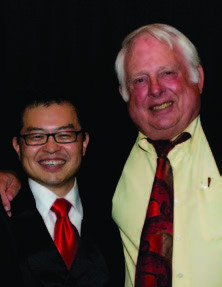I have a particular interest in taking care of the head and neck cancer population and the rehabilitation they need after their cancer care. Patient safety and quality improvement is a real area of interest for me. We do a good job of guiding our residents to become good clinicians and good surgeons. Traditionally, we’ve done a great job with basic science and translational and clinical research. I think we need to continue to evolve the education we provide to make our systems safer and provide a higher quality of care.
Explore This Issue
April 2022 His childhood otolaryngologist became his mentor.
His childhood otolaryngologist became his mentor.
MAS TAKASHIMA, MD
Chair, Department of Otolaryngology–Head and Neck Surgery
Houston Methodist Hospital, Houston, Texas
When I was six years old, I was diagnosed with a cholesterol granuloma in the petrous apex and needed surgery. My parents had just immigrated from Japan to Texas and didn’t speak English. They brought me to Baylor College of Medicine, where I saw Dr. Paul Johnson [in the photo above, on the right] on the otolaryngology faculty. Dr. Johnson was amazing both as a clinician and a human being—he was so kind to my parents at a very stressful time. Since my condition was chronic, I would have follow-up appointments with him every three to six months from elementary school through high school. As a young adult, I told Dr. Johnson I was interested in medicine. He gave me advice, and after college I wound up doing a rotation with him. It was a life-changing relationship. After I graduated from medical school, Dr. Johnson was very supportive of my application to otolaryngology. I became an otolaryngology resident at Baylor College of Medicine, being trained by the doctor who had taken care of me since I was six years old.
I enjoy the interactions and relationships that come with teaching. I was a residency program director at Baylor for 14 years. Now, I have former residents all over the country with whom I keep in touch. It’s a great feeling to know you’re training all of these amazing otolaryngologists who are out there helping people.
I’ve aspired to use what I’ve learned in my 18 years of academics to build my own department, as well as a new ACGME otolaryngology residency program at Houston Methodist. We currently train residents from three different programs: Baylor College of Medicine, University of Texas Medical Branch in Galveston, and the University of Texas in Houston. This is partly because we have a high surgical volume with tertiary and quaternary care patients. It’s also because Houston Methodist is an academic and research institute that prides itself on innovation and state-of-the-art care. We have a director of innovation who interfaces with artificial intelligence companies like Google and Amazon, and an entire floor of the hospital is dedicated to innovation.